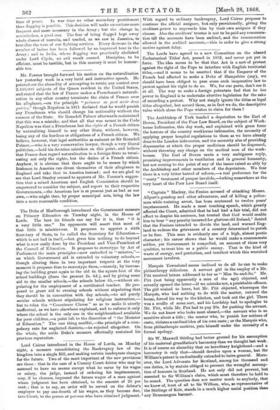Mr. Forster brought forward his motion on the naturalization law
yesterday week in a very lucid and instructive speech. He pointed out the absurdity of attempting to retain any control over 2,450,000 subjects of the Queen resident in the United States, and stated that the law of France makes a Frenchman's naturali- zation in any other country terminate the claim of France over his allegiance,—on the principle " personne ne peat avoir deux patries," though Napoleon in 1811 declared that he would punish any Frenchman who should change his nationality without the consent of the State. Sir Bounden Palmer afterwards maintained that this was a mistake, and that all that was meant in the Code Napoleon was that a Frenchman lost the rights of a French citizen by naturalizing himself in any other State, without, however, losing any of the burdens or obligations of a French citizen. We believe, however, that legal authorities as eminent as Sir Bounden Palmer,—who is a very conservative lawyer, though a very liberal politician,—hold his doctrine mistaken on this point, and believe that France does regard naturalization in a foreign State as termi- nating not only the rights, but the duties of a French citizen. Anyhow, it is obvious that there ought to be means by which Irishmen in America can divest themselves of their allegiance to England and take that to America instead ; and we are glad to see that Lord Stanley seemed to approve of Mr. Forster's sugges- tion that a mixed American and English Commission should be empowered to consider the subject, and report to their respective Governments,—the American law is at present just as bad as our own,—who might then, by proper municipal acts, bring the law into a more reasonable condition.


































 Previous page
Previous page